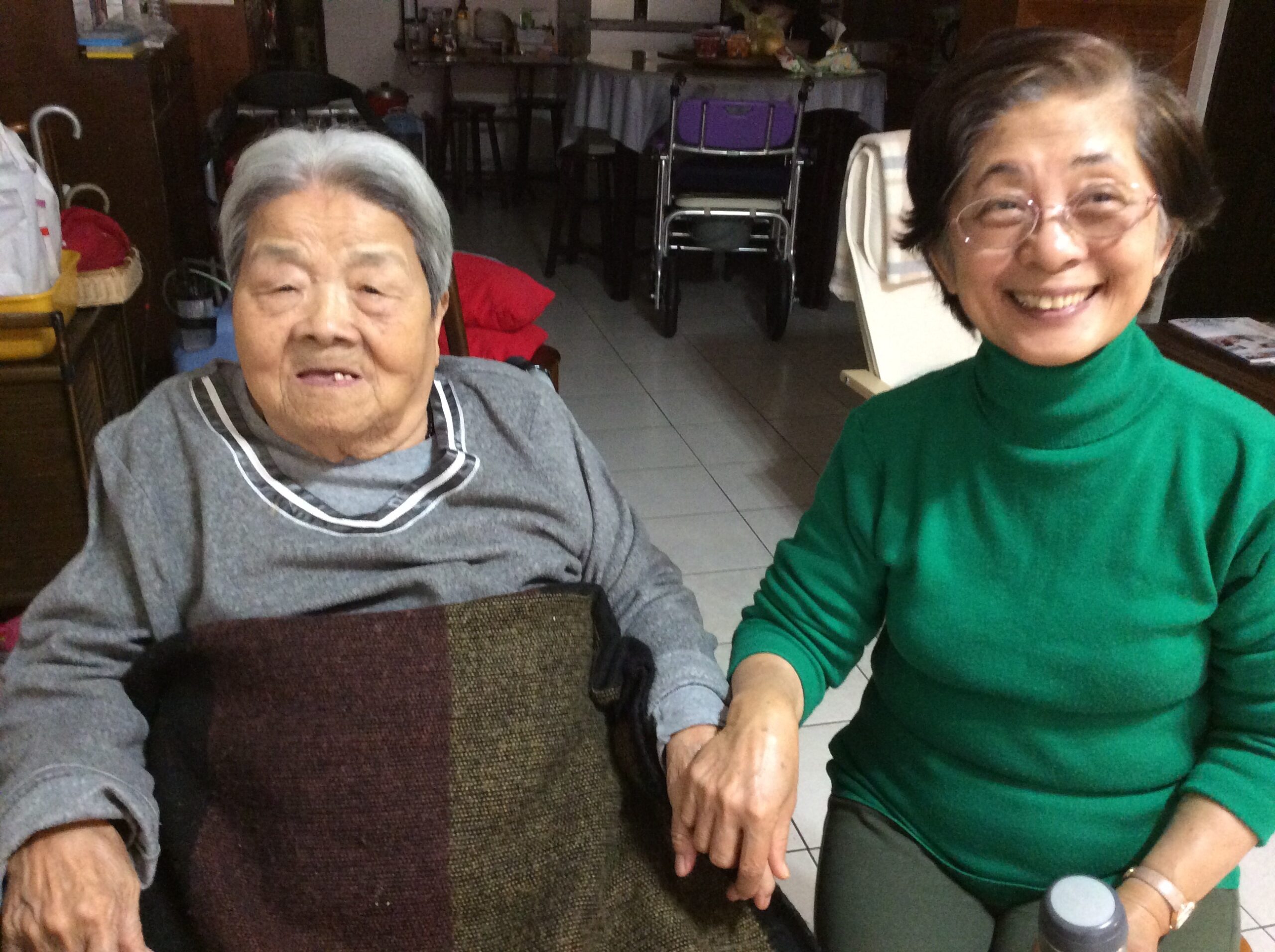Read Original: Chinese (中文)
Hello everyone! On behalf of all of her descendants in Taiwan and abroad, I am here with you today to say farewell to my mother. Many of the family and her friends have already written about how they miss her, which are printed here in the pamphlet. I hope these pieces, especially the poems including the two that my sister Hsiufang will read out later, may set free your imagination and emotions so that, besides ears and eyes, you may even use “heart” to experience my mother’s 100-year journey!
(Note: in Taiwanese dialect): Because many relatives and friends are Hakka, I will speak forward mainly in Mandarin.
Although mother’s life on the surface appears unpretentious like those of common folks, it is actually the embodiment of the noble spirit of the aristocrats. vivid and splendid, brilliant and dazzling enough for each of you to reference and plan for a better tomorrow!
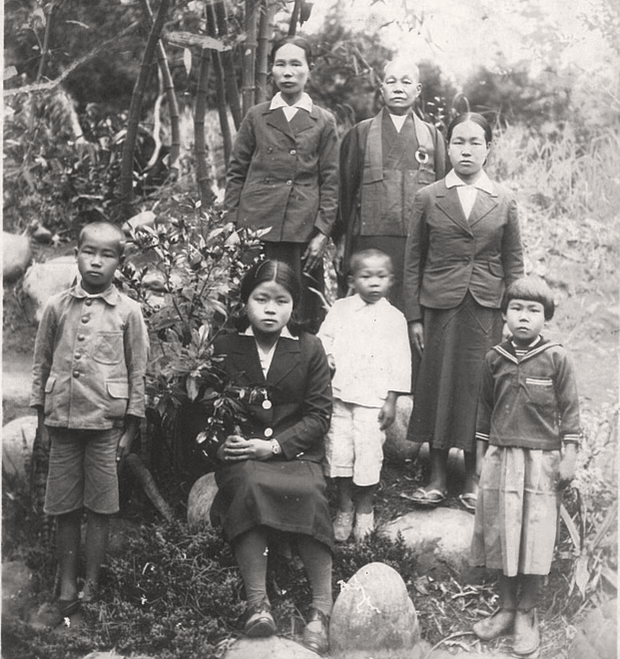
Mother’s first quarter century started as a tiny little rural child. Despite that heavy household chores of fetching well water, washing dishes and clothes, taking care of even younger siblings, etc., all fell on her, she would still go to the brooks or woods whenever she had a chance, to find oysters, fish small fishes, pick up small crabs, catch cicadas or dragonflies. Or she would gather fireflies to make a night light, tie a string to a bamboo shoot insect and let it fly, or climb trees to watch a mother bird feed her babies with earthworms, poke a honeycomb to drive away the bees in order to eat the honey inside. Nature has nurtured mother’s extrovert and liveliness since toddlerhood, therefore her hands became nimble and mind sharp. She’s healthy and optimistic.
When in elementary school, lively and strong, bouncing and jumping, mother was spotted by my great grandmother on a narrow footpath over the rice fields, who said this girl must be agile because her little finger was notably bent (note: in Taiwanese dialect the single-character words for agility and bending sound alike.) So at age 13, mother was “promised (to be marrying someday)” to her classmate, my father, and moved into the Chou family as a child bride. As childhood sweethearts, their innocent childish first love amazingly lasted a lifetime, of course they had been in a very special splendid state of love!
My great grandmother was right. As a child bride (laborer), mother would willingly husk rice, grind rice, sun-dry grain, fetch water and haul manure to grow vegetables, feed pigs, cows and chickens, and drive ducks to eat pests. She took turns getting up at three o’clock in the morning, going to the kitchen to pick vegetables, build a fire, cook a big pot of rice, and then shoulder-carry a hundred-pound load of food to the fields to feed the workers. At night, she washed clothes at the stream. She also learned to give injections, and by the age 13 already knew how to inject my grandmother timely who was suffering from tuberculosis as the doctors were far in the town. My great-grandfather was impressed and he encouraged my mother by saying: “It doesn’t matter that you have to work much harder than others now. They are gold, and we are dirt; In the future, we will be gold instead!”
Mother’s second quarter century followed when, at age 23, she went north with my father’s bank job and finally left the farming village where she had toiled for 10 years. Unexpectedly, my grandfather’s farming business began to decline. As the eldest son, my father had an obligation to provide financial assistance regularly. My grandfather was so stern as to demand: “Even rice bran has oil extractable for bringing home!” (note: repeated in Taiwanese dialect). But my parents were not displeased at all. When they subsequently learned that my grandfather had been compelled to pledge his land for debt, they resolutely poured out all their savings to redeem it for my grandfather. Years later, when my grandfather was dying, he told my mother that piece of land should belong to her and my father. “No, you need not do that,” Mother replied. “None of our five younger brothers you are raising have yet grown up and started a family. Leave the land to them for their needs. Please rest assured.”
Mother never hesitates to take care of relatives back home. Both my uncles came to Taipei to study at high school and college, and lived with their sister’s family for a long time. One granduncle of mine on my father’s side who came to the city to seek medical treatment also lodged with us together with my grandaunt. One of my cousins who came to Taipei to attend middle high school requested to stay in our house until graduation. There are countless examples of such generous or timely assistance. Today, my uncle Zhongzhao writes to remember my mother in “My sister-in-law is like a mother”: “I was struggling to get into college while working part-time in high school. I was hesitant about my tuition fees and didn’t know what to do next, whether to give up my enrollment. I went to my sister-in-law and was told: “When heaven closes a door, she opens a window. When the going gets tough, the tough get going. Let’s cook sweet potato soup when we run out of rice (note: repeated in idiomatic Taiwanese dialect). She meant, don’t worry about how the sky is falling, just move forward and come to me when you get to the unsolvable problem.
From then on, whenever there is a major problem, I go to my sister-in-law rather than my parents. In my life there has always been another village when I make past the dark willows along the winding mountain trail to reach the bright blooming flowers. Important turning points, such as completing college, getting admitted to the railway bureau, getting married, having a child, and buying a house, all seemed to have the presence of my sister-in-law as my backer. Over hurdle after hurdle I strided. My sister-in-law did not provide me with substantial financial assistance, but she was like a mountain of support behind me, allowing me to move forward fearlessly in the face of hardship and obstacles.”
Mother’s niece Dongyu also recalls, “When I was little, my parents often took us six children to play at Auntie Juh’s house on Zhongshan North Road… Auntie would perform “juggling three balls” with props such as oranges… she could even use four or five oranges… Auntie’s dexterity was amazing!” Indeed, mother was so filial to her mother-in-law and loved her juniors. Her big heart and unselfish deeds have taught us her children more than her words till this day!
Mother’s kindness and enthusiasm also made her the most popular in the neighborhood. Many times, mother was invited by relatives or friends to lead a bride into the bridegroom’s house for the wedding ceremony. How we loved so much to see our mother as radiant as the bride, when we were children!
Mrs. Chen, a neighbor in the export business who lived in a big building at the entrance to the lane, had for a few years rush orders for small-beaded handbags. With the help of my mother, groups of lady neighbors were called to our yard every day, sat down and embroidered these handbags while chatting. Even we children just off school liked to take part, picking up a fine needle to pierce through some tiny black beads, which had been boisterously fun.
Mother’s niece Yunru remembers Mother like this: “Auntie Juh’s intelligence is demonstrated through her various needlework skills… She personally makes all kinds of beaded bags as gifts for the wives of Uncle Meisin’s social contacts. I believe these exquisite embroidered bags must be loved by everyone, so Auntie Juh has really given Uncle Meisin best career assists!”
In that era, it was popular for people to start “meetups”, which were financial mutual aid societies. Those who recruited preferred candidates like my father who held a lifelong-secure bank job, or called an iron rice bowl, because the holder wasn’t likely to be dismissed or to default on meetup obligations. As a result, dozens of meetups invited my mother to join. Soon Mother, who excelled in arithmetic, learned to flexibly bid for funds from lower interest rate meetups, and place them in the ones where she can receive higher interest, earning the meager differences in interest. To her and my father’s surprise, as Mother participated in more and more meetups, considerable additional household income had been cumulatively created!
But my mother continued being always thrifty and practical. I can’t remember a time when I was a child my family of eight ever went out to dine together in a restaurant. My aunt, also a child bride, who has known my mother for 80 years, says today: “In those less affluent times, even cloth is scarce. How to meet the clothing needs of the growing bodies of children? Sister Ah Juh takes apart the seams of the clothes, connects them with cloth of a similar color, and sews them back together. In this way, the modified clothes can still be worn by the child for another year or two.” It was through such frugality that my mother and father made it possible for every child in the family to explore abroad, get gilded by obtaining a foreign degree!
When mother came abroad to visit us many times during the third quarter century of her life, her childlike disposition remained. She’s happy to explore outside the house, ascend hills or approach water, climb trees or hang from branches, only that her childhood companions had now become her own little grandchildren. In Taiwan, she’d go to the park with neighbor groups every morning to exercise. After returning home, she’d either knit and embroider, play puzzle games, practice calligraphy and singing, or do volunteer work for the community on environmental protection or public welfare.
In the 88th year of the Republic of China (note: 1999), a public television station filmed “Taiwan’s Daughters” on child brides, as part of its “Taiwan’s Centennial Memories” series. When Mother was interviewed by a large pack of reporters, she was elegant and humorous, witnessing her natural quick thinking and persuasive eloquence. The film also featured my 70-year-old mother in the park, arms outstretched around the trunk of a big tree and snuggled, palms sliding and touching the bark. Her gaze exudes the unparalleled calmness that a pure and kind heart can possess, whether from nature or, for me, even from heaven.
My father passed away in the fourth quarter century of my mother’s life, and she gradually became unable to walk. However, the wheelchair-bound mother still liked to go out every day to bask in the sun as much as possible, giving warm-greetings to and chatting with everyone she met, which she enjoyed and felt comfortable about very much. Her children who had retired from work got to come back to Taiwan more often to accompany her. Ah, how I miss the many happy moments when I reunited with my mother, such as watching together birds on trees and turtles in water in the sunshine of Tianmu’s Sulfur Creek; jumping onto the train with her in wheelchair to revisit her Longtan hometown; and the tour of appreciating the Tung blossom, and so on!
Later, suffering from illness and frequent hospitalizations, my mother remained resilient and fearless. She was miraculously discharged safely from the hospital countless times under very dangerous circumstances. Another niece of hers, Yunshan, recalled in this way: “I went to the hospital to visit Auntie Juh. As soon as I arrived at the ward, the nurse told me that as long as this elderly lady is in the ward, there is laughter.” That’s right. Since childhood, I have never heard my mother sigh once, nor have I seen the elderly her appearing discouraged by illness or medical treatment. Such love and perseverance towards life will always be the best example for each of us!
Mother, your youth has all been spent in the drudgery of the farm, and then the toil of bringing us up continues to torment all ten of your fingers till they are entirely bent out of shape. However, because of your lifelong struggle, now your descendants can each be in a good starting point, continue to uphold your noble spirit to make the world better, so in our minds, you are our pride, you have never been more beautiful and elegant than at this moment. We will miss you always, until the day we meet again in heaven. Mother is the most beautiful! We love you forever!
天黑黑 要落雨
Ink dark sky rain’s a-gonna fall
A heaven between us as it had been an ocean,
Many tearful goodbyes and joyful reunions,
This is another —
Amà,
Forever
in my heart and in my actions,
I strive to honor the love and gift
of your tremendous life —
Dutiful, devoted, doting Amà,
Shrewd, strong and wise Amà,
Unsinkably resourceful
intrepid through hardship
yet never hardened to joy Amà,
Ever quick to laughter Amà —
Mischievous Amà of the secret wink and hand squeeze,
Playful Amà, singer of songs and rhymes,
Competitive Amà, lover of games and puzzles,
Crafty Amà, knitter of 10,000 sweaters,
Comforting Amà, protector from thunder —
Amà, in the time of your going, there were terrible storms.
But I wasn’t afraid because you are in me.
I am because of you.
I love you forever, Amà,
Amà,
Amà.
***
Amà was 49 when I was born. I am 49 today as we say goodbye to our incredible matriarch. When my parents couldn’t properly take care of me while they completed their medical residency in the U.S., my mom brought me back to Taiwan to live with Amà and Agōng. I will always be grateful for their decision — it was painful to separate from their baby girl, but because of their sacrifice, I received the love and care of the most devoted grandparents and uncles and aunts, and I forged an especially deep bond with Amà. She doted on me and taught me songs, and I slept in her arms with my legs sandwiched between her thighs. She always made me feel so loved and safe. I went everywhere with Amà and wherever we went, people would greet her with warmth and respect; they often came to seek her wise counsel. Through her example I saw how to lead a life of courage and value, how to 做人— taking care of family, helping others, creating opportunities and connections, building community. I aspire to live up to her legacy.
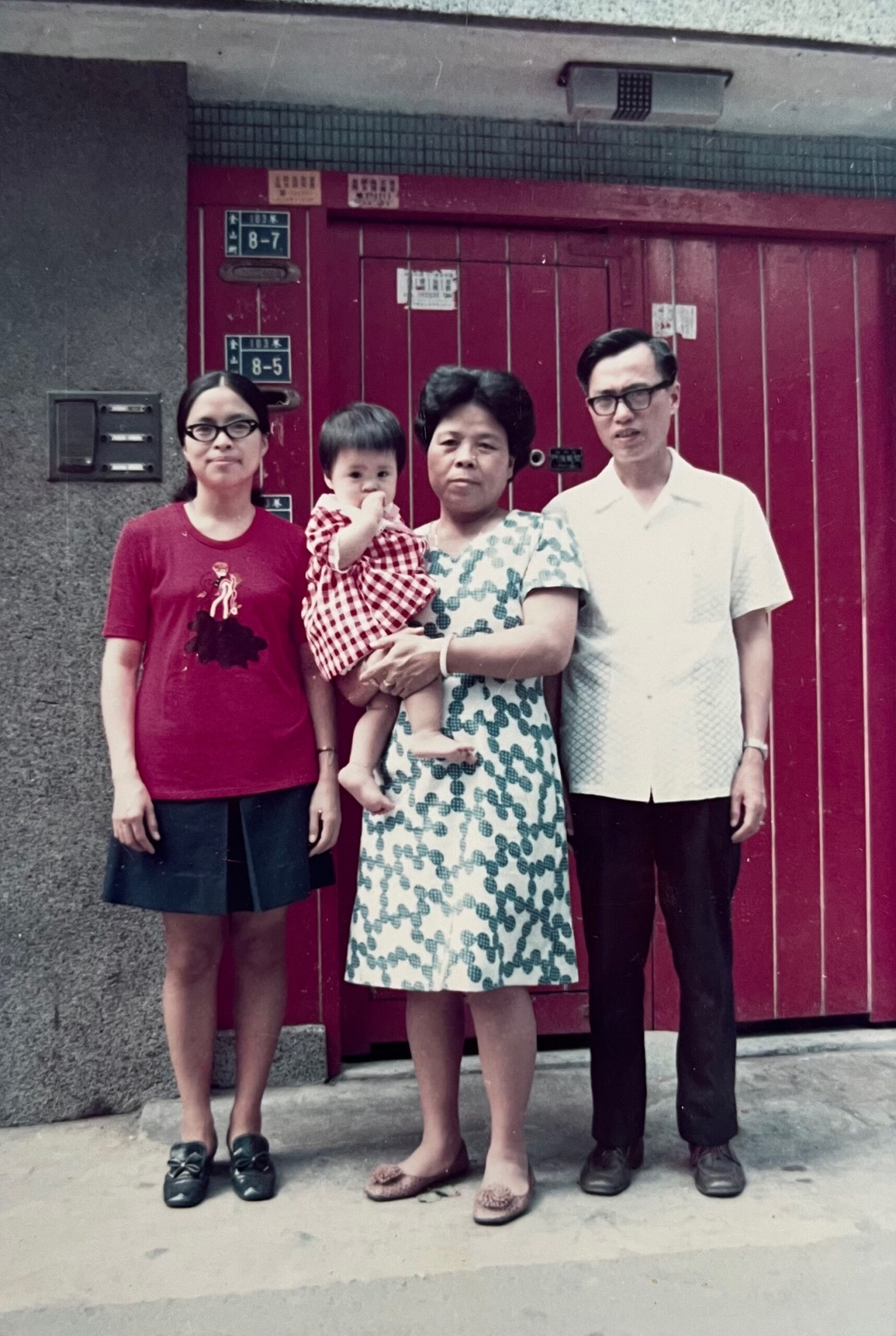 Mom, me, Amà and Agōng. Taipei, 1974.
Mom, me, Amà and Agōng. Taipei, 1974.Read Translation: Chinese (中文)
They say that the seed of you exists
in your grandmother’s womb
when your mother comes to be.
Every mother’s daughter
brings more daughters
And every daughter’s mother
is born of the daughter
of a mother.
I did not know my grandmother
and she did not know me.
Yet I once lived within her
sharing her blood and my mother’s
the imprint of her will, her dreams, her tragedies
embedded in the cells that would become
my flesh and bone.
Yet she knew my mother
and my mother knows me.
When she looked at my mother, she saw
echoes of herself
a little lost child, wide eyes drinking in
every last bit of love she could find
a playful girl stepping into the tentative grace
of a dutifully brave young woman
a mother whose overflowing heart
could never hold enough for her to keep.
When my mother looks at me, she sees
a wellspring of strength and resilience
that she does not recognize in herself
but it is familiar.
When my mother looks at me, she sees
hands that transform reams of wool into beautiful fabric
that she does not recognize in herself
but it is familiar.
When I look at my mother, I see
a daughter who could never get enough
from her mother’s overflowing heart—
it is familiar.
When I look at my mother, I see
a mother who sees
echoes of herself in me
the little lost child, the playful girl
the brave young woman, an overflowing heart—
it is familiar.
I did not know my grandmother
and she did not know me.
But I once lived within my grandmother
sharing her blood and my mother’s
and she lives on within me.
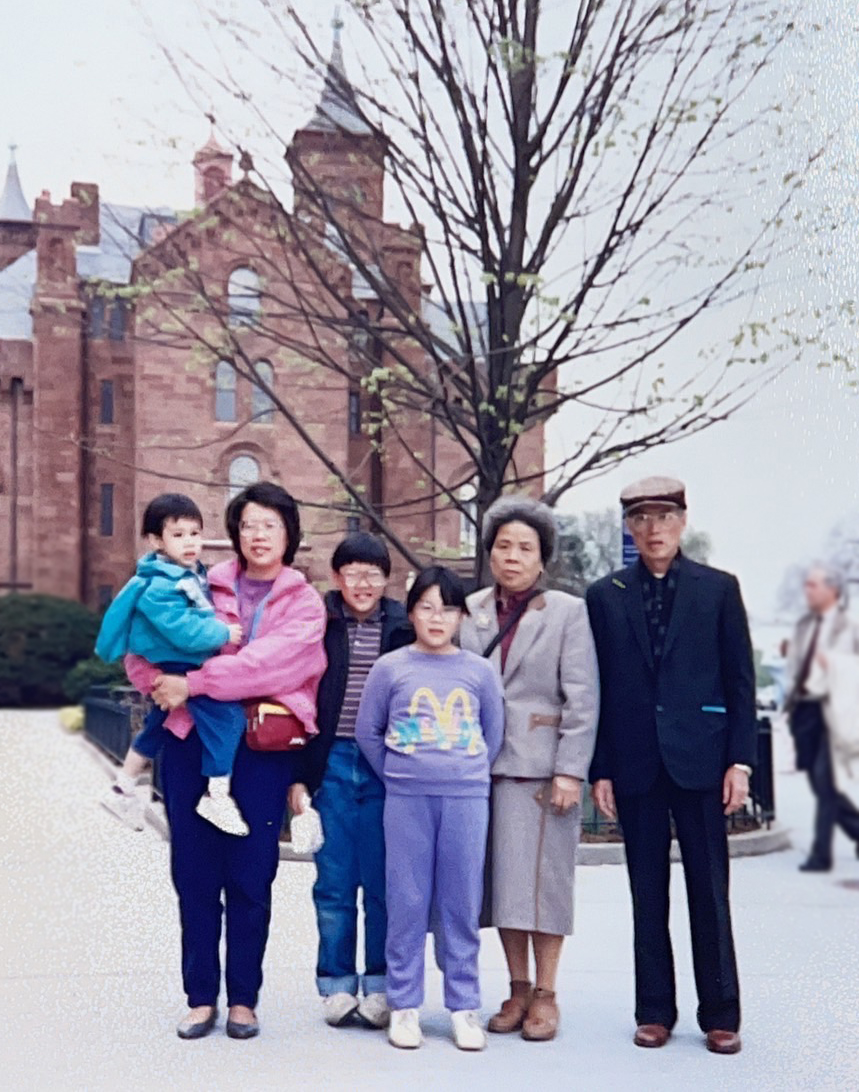
Read Translation: Chinese (中文)
I grew up speaking English and Mandarin, but my nainai spoke Taiwanese and Japanese. It’s hard to recall what short conversations we’ve had, but I can easily remember how she cared for me through her cooking.
Poached chicken freshly butchered from the market, blanched yam leaves dipped in soy paste. I still make this simple meal for myself often, and hope to one day be able to make it for my children.
Her person may be gone, but my nainai lives on through the fruit of her actions.
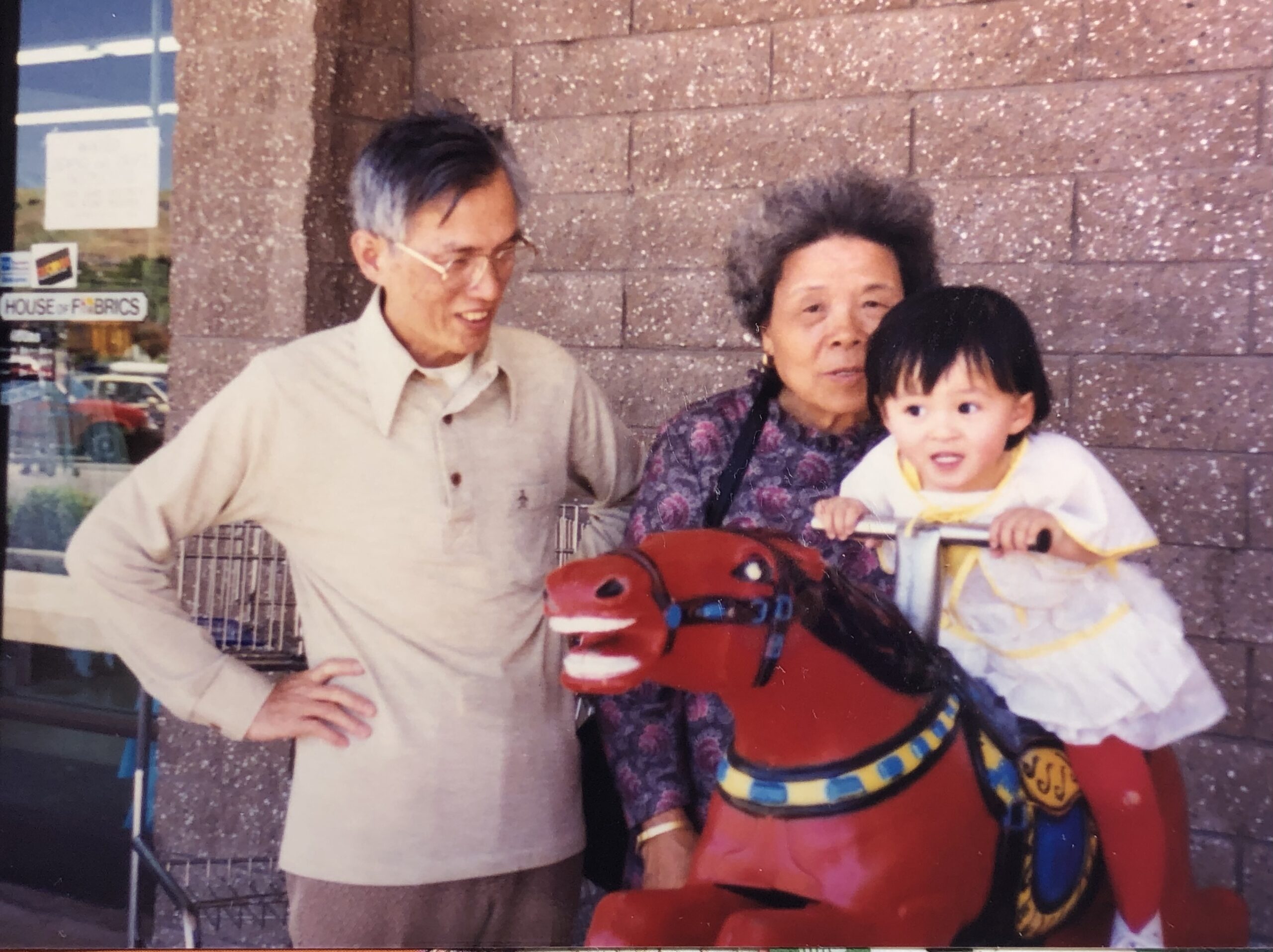 Nainai, Yeye, and me. California, circa 1991.
Nainai, Yeye, and me. California, circa 1991.My dad told me that Grandma had passed away. I remembered a morning more than 20 years ago, the only time that I had been left alone to spend time with my grandmother. That morning we went to the market and Grandma stopped in front of a stall to buy me a bowl of wontons. When the owner heard that I was Grandma’s grandson who was visiting from the United States, she gave us extra wontons. I have eaten a lot of wontons in my life, but I can still recall how delicious that particular bowl was and how it was to spend time with Grandma. I will miss her but am comforted that she is at peace. May she rest in joy!
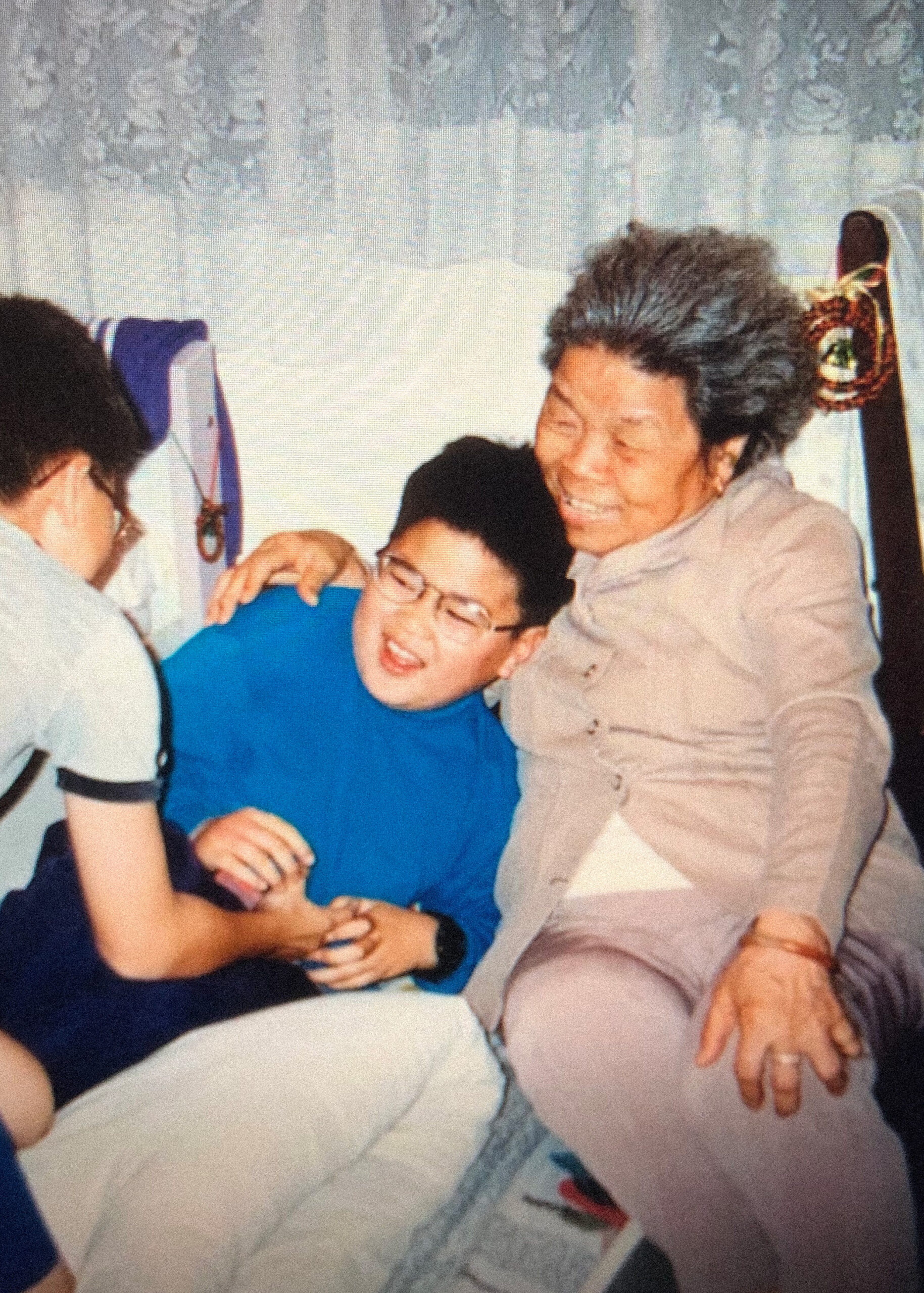
“There is always a way—take action when it is needed, and cook sweet potato soup when the rice runs out.”
My elder sister-in-law did not have a high degree of education, but she had a wise philosophy on life. It was not easy for me to get into university while working in addition to studying. When I was finally admitted into university, I hesitated about the tuition fee and didn’t know what to do next. While wondering whether I should give up on the registration, I went to find my elder sister-in-law and she told me the above words. The meaning is simple but full of wisdom: “Do not worry, just move forward. Come to me when you really encounter a problem that cannot be solved.”
From then on whenever I encountered a major problem, I would go to my elder sister-in-law instead of my parents. Although my life has not been one smooth journey, I’ve been able to have several major accomplishments in my life such as going to college, getting into the railway bureau, getting married, having children, and buying a house—all with the support of my elder sister-in-law.
Although my elder sister-in-law did not support me financially, she gave me the strength to move forward without fear when facing difficulties and obstacles.
Now my elder sister-in-law has suddenly passed away after a long life, and I feel as if I am a child who has lost his mother. Looking back from the present, the past feels like yesterday and the pain in my heart is beyond words.
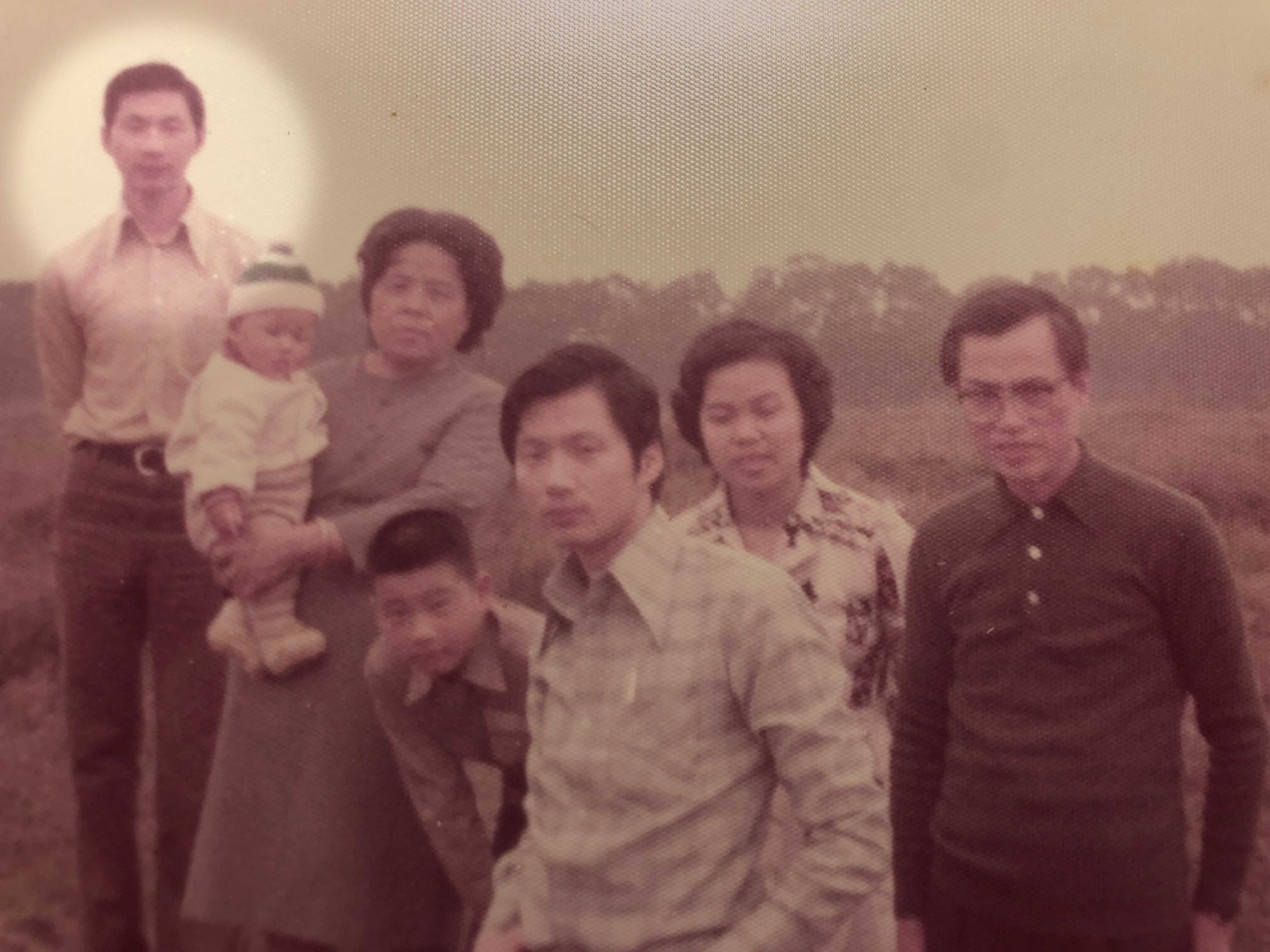
Dictated by Huang Xiufang, recorded by Wei Yunshan
January 14, 2023
Read Original: Chinese (中文)
Surrounded by many children, Sister AJuh diligently managed the household and was very frugal. She never threw away nor wasted food, and made sure that every meal she cooked was finished by the family.
In addition, in those less affluent times, it was not easy to obtain fabric. How to solve the problem of clothing the growing bodies of children? Sister AJuh takes apart the seams of the clothes, connects them with fabric of a similar color, and sews them back together. In this way, the altered clothes can still be worn by the child for another year or two.
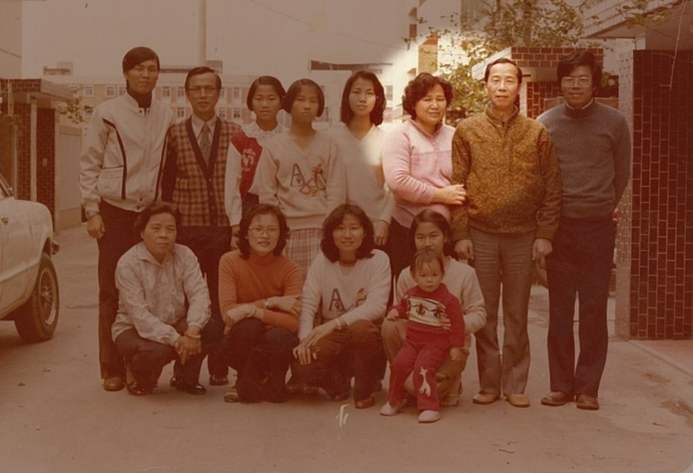
When I was young, my parents would often bring the whole family to Aunty Juh’s house on the first day of the Chinese New Year. At these reunions between our two families, there were always a lot of children and thus we played many lively games. As children we were mostly intent on how to have fun on New Year’s Day, and did not pay much attention to the interactions between the adults.
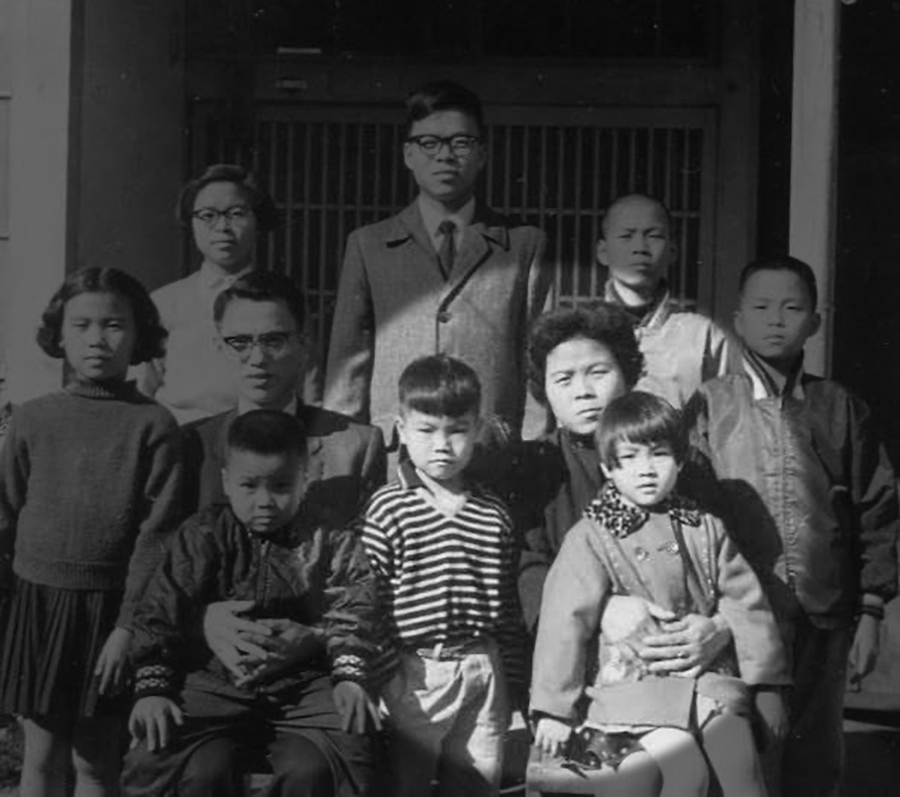
The Wei family lived in Longtan, Taoyuan. My grandparents had two sons and four daughters. Aunty Juh was named Chiu Juh and was the second eldest, and my father, Ting Kui, was the third child. (The Wei family tree: grandfather Wei Yong gong, grandmother Qiu Tingmei, eldest daughter Yuye, second daughter Chiu Juh, eldest son Tingkui, third daughter Zhaozhi—who passed away early, fourth daughter Yuemei, second son Tingqing). Aunty Juh was born in the year of the pig and my father was born in the year of the rabbit. They were four years apart, and their relationship was special.
According to my father’s recollection, Aunty Juh went to live at the Chou family at a young age as a child bride and Uncle Meisin worked in the bank. After working at several different branches, he was transferred to work in Taipei. Around the same time, my father was admitted to Taipei Middle School in Taipei. At that time, the transportation and residential facilities were not yet very comprehensive, so it was decided that my father would leave Longtan to go study and live with his second sister in Taipei. This is the reason for the deep bond between Aunty Juh and my father. Throughout his life, my father often recalled the kindness of Uncle Meisin and Aunty Juh who cared for and looked after him. For many years our two families would celebrate the Spring Festival together, simply because of the deep relationship between the parents.
Like most Taiwanese women of the time, Aunty Juh was not given the chance to receive a higher education. Yet, in addition to running a family, she had a strong interest and passion in running financial activities in her own life circles. As far as I can remember, she often served as the head of the financial mutual aid association (commonly known as to start a meetup). This was not an easy job, for she had to take responsibility for the credit assessment of all members and ensure that the process went smoothly from the beginning to the end. The pressure of the role is said to be more than that of the modern financial system, which is definitely not an overstatement.
The talents of parents are often inherited by and seen in their children. The cousins born to Uncle Meisin and Aunty Juh are all successful in their studies and careers, a testament to the struggle and hard work of the two elders. Passing on her adventurous spirit, Aunty Juh encouraged her children to go abroad for study and opportunities, which also resulted in her spending less time with her children in the latter half of her life. It is a small regret, but everything in the world has its tradeoffs.
Aunty Juh passed away at the age of nearly 100 after living a happy and fulfilling life. As a nephew I am sad, but glad to be able to write this short essay to commemorate her life.
Kuo Yuan Ye’s “pang” (Note: “pang” is “bread” in Taiwanese)
When we were young our family lived in the Shilin District. At the entrance of our street was a bakery called Kuo Yuan Ye. When Aunty AJuh came to visit us, she often carried two big bags of Kuo Yuan Ye’s “pang” in her hand. That was the taste of happiness when we were young! Western-style bread was something that our parents, who all ate rice, seldom gave us. Those “pang” flavors, such as red bean, cream, and pineapple, were simply too delicious to us at that time!
A family of 8 people squeezes into a taxi
When we were very young my father and mother often took the six of us to play at Aunty AJuh’s house on Zhongshan North Road. At night, when we wanted to go home, cousin Tehchung would often help us get a taxi. My father, mother, and the six of us would then all squeeze into one taxi to go back to the Shilin home.
Juggling three balls
When visiting Aunty AJuh’s house for New Year’s celebration, Aunty AJuh would perform juggling by using three oranges. Aunty AJuh had quick reflexes and could even juggle up to 4 or 5 oranges. Aunty AJuh’s dexterity was amazing!
Domestic work (beaded crochet purse) Aunty AJuh helps to finish the seam
Aunty AJuh was a skilled craftswoman. I remember that she had a handicraft that was popular at that time – making beaded crochet purses. When Aunt Ah Juh came to Shilin to visit us, she often brought crochet work with her, chatting and crocheting at the same time. Aunty AJuh’s works were exquisite and could be given as gifts. She gave purses to the wives of my uncle’s colleagues and bosses at Chunghwa Bank, and everyone loved them very much! She was truly a good and wise wife.
Another time, I had a homework assignment in school that happened to be to make a beaded purse. When Aunty AJuh saw me trying to close the seam, she said, “Ah! Leave this simple task to me, and I will help you finish it.” Not long after, Aunty AJuh finished hemming the edges. It is clear that Aunty AJuh loved her younger generation!
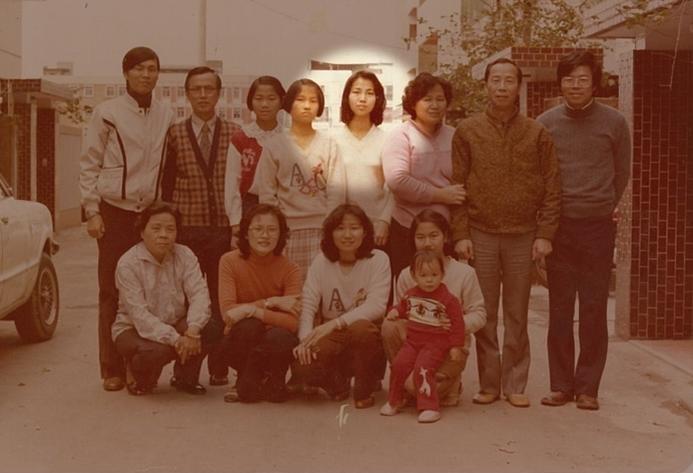
In my memory Aunty Juh is an elder who was wise, brave, intelligent, and heroic. Her traits and talents are evident in her outstanding children, whom I need not elaborate on.
I remember a time when she led a group of us little turnip heads from Taipei to take a train back to our hometown of Longtan. Just as the train was about to leave the station, she realized we had boarded the wrong train! There wasn’t enough time to go back to the platform to change to the opposite train so she hand-carried us, a group of little turnips, directly across the railway track and onto the reverse train! It was so thrilling and exciting!
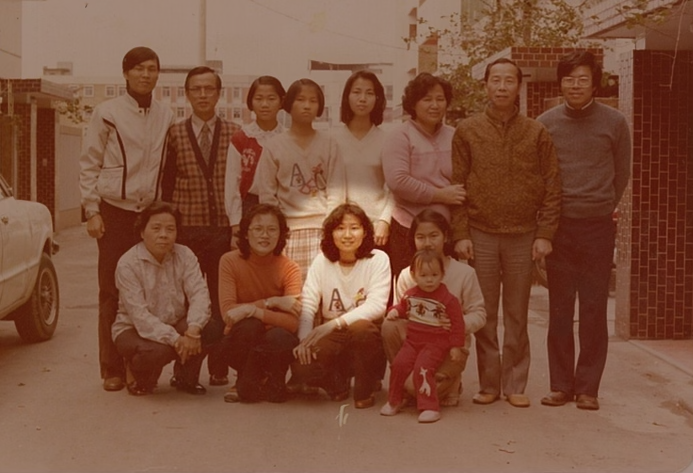
Aunty Juh’s cleverness was mainly demonstrated through her various famous skills. When I was young, I once went with my older sister to spend the night at Aunty Juh’s home on Zhongshan North Road. After finishing all of the housework that night, Aunty Juh picked up a crochet needle and wool ball and made cylindrical long tassel handbags for me and my sister with just two or three strokes! I still remember that mine was an orange bag, and the one for my sister was lavender.
When I was a child, colorful beaded crochet purses with gold frames were very popular. Aunty Juh made various beaded bags as gifts for the wives of Uncle Meisin’s colleagues. The exquisite bags were loved by everyone, and Aunty Juh was a really good helper in boosting Uncle Meisin’s career! All those who are good at woman’s domestic handicrafts have a unique skill: by just looking at other people’s works they can reverse engineer the production techniques and steps in their minds, and the finished product will be even better than the original. My dear Aunty Juh, why can’t I, as your blood-related relative, get even a little bit of your talent!
My dear Aunt Juh’s heroism was spread by the gifts she used to bring along with her whenever she visited our home in Shilin. The freshly baked pineapple buns, milk buns, and sesame buns from Guo Yuan Ye’s bakery at the corner of Guifu Street nourished the stomachs of her growing nieces and nephews who looked forward to her visits every time.
Dear Aunty Juh, the last time we met was almost 27 years ago when you and Uncle Meisin came to visit my new home and gave me advice on what to look out for. I would like to thank you again for your love and care for me as a youngster!
I also want to tell you that I still have the heart-shaped gold ring you gave me when I was a child, and that although I have not spoken Hakka for many years, I still remember when you corrected me about the two different expressions and pronunciations of “we” in Hakka. Unfortunately with the passage of time, I have only a vague memory of the correction you gave me, but the imprint you made on my heart and mind as a relative, second only to my grandparents, will never be erased! I wish you a good journey, Aunty Juh! We will continue to be family in heaven!
I have a strong memory of my Aunty AJuh, the elder who took great care of our family, from when I was a child. During the New Year holidays, my father would dress neatly and take my mother and the six children of our family to Aunty AJuh’s house to gather with Uncle Meisin and our cousins.
Usually when we arrived at Aunty AJuh’s house, the table full of food would already be prepared. It’s hard to describe how we all managed to fit at the table. There were always more than a dozen people in the room, but we all ate together around the big table. I remember that the table was full of people. It was so lively! During meals, Aunty AJuh would ask us questions and listen to our answers. When pleased, she would respond to us with warm smiles, hearty laughter, and words of encouragement. It made me, as a child, feel extremely honored and special!
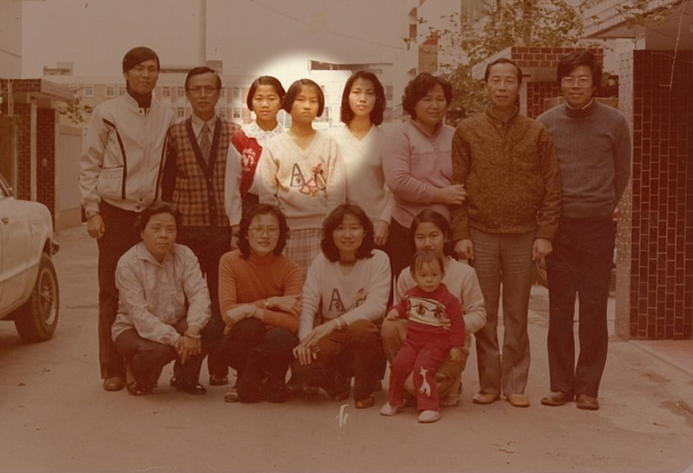
The after-dinner entertainment was also very lively. Aunty AJuh would juggle using four or five oranges. Her reflexes were amazing! Aunty AJuh’s home also had very advanced home entertainment equipment at the time: VHS video recorders. Aunty AJuh rented videos in advance to watch with us. One of the videos was a Japanese suspense mystery TV series called “W’s Tragedy.” The male protagonist, I still remember, was the Japanese actor Koji Ishihara. As a young student at that time, the content of the entire TV series was far beyond my understanding. I just remember thinking, Oh! Japan is really advanced! That’s what Aunty AJuh is like, she does everything well!
A few years after my father passed away, I heard that Aunty AJuh was hospitalized in Taipei Veteran Hospital so I went to the hospital to visit her. As soon as I arrived at the ward, the nurse said that as long as this elderly lady was in the ward, there would be laughter. At the time, Aunty AJuh was still quite capable in her language and communication skills. While talking to her, I was suddenly reminded of the wit and wisdom of my late father. It was hard to hold back the tears from my eyes.
The Wei family is a talented family. The younger brother, a high-achieving student who graduated from the Department of Mechanical Engineering of National Taiwan University after the retrocession, and the older sister, whose fate was determined just after graduating from elementary school to become a good wife and mother for the rest of her life—under the era of “a woman without talent is a virtue.” If Aunty AJuh had the opportunity to receive higher education, wouldn’t she have been able to become an outstanding financial talent in a large institution?
Aunty AJuh has completed her life of nearly a hundred years. My cousins are all successful in their studies and careers, and it is a testament to their mother’s excellence and good fortune! May Aunty AJuh be joyful and her soul rest in peace!
Aunty Juh had a pair of skillful hands, and I would receive handicrafts from her when I was a child! What left the deepest impression on me was a small yellow leather bag with beads and the clothes that my cousins could no longer fit. In those days when we were not very rich, those things were precious to me.
In addition, Aunty Juh’s house was not only warmly decorated but tidy at the same time! Aunty Juh fits my definition of a “good wife and mother” perfectly!
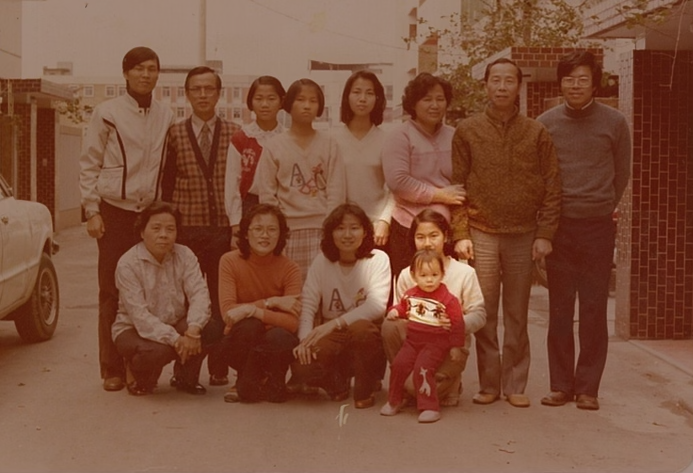
Read Original: Chinese (中文)
Ms. Wei Chiu Juh is my father’s second sister. In our family we called her “AJuh Gu” in Hakka. My father left his hometown of Longtan to go study in the North after graduating from junior high school. During his studies in Taipei, he was taken care of by Aunty AJuh and Uncle Meisin. Therefore, my father respected his sister very much. Because Aunty AJuh cared about her younger brother (my father), Aunty AJuh also took good care of our entire family. In my childhood memories, our two families often interacted with each other. Aunty AJuh cared for us as if we were her children.
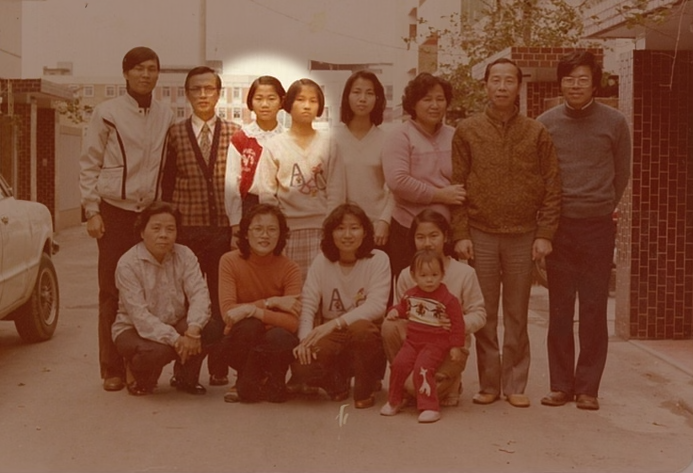
My most vivid memory of Aunty AJuh is her warmth & hospitality. I still remember when I was very young, Aunty AJuh liked to invite me and my third and fourth sisters (Yun Shan and Hua Hui) to stay at her home for a few days. Although my mother was always sorry to trouble her so much, Aunty AJuh’s earnestness made it hard for us to refuse.
What I remember the most was a time when my mother took us on an outing to meet Aunty AJuh. Our intention was to go straight home afterwards, but Aunty AJuh spontaneously invited my sisters and me to go home with her and stay at her house. All of the reasons that my mother gave as to why that would be inconvenient were refuted by Aunty AJuh one by one. Aunty AJuh’s house was neat and elegant and thus very appealing, so of course we children were quickly persuaded by her. My mother also gave in and accepted Aunty AJuh’s kind offer. My mother could only exchange a few words with my sisters and me before going home alone. Aunty AJuh happily took us to her home, prepared delicious food for us, and warmly entertained us. A few days later, my mother came to Aunty AJuh’s house to pick us up.
When we would go to Aunty AJuh’s house during the holidays, Aunty AJuh not only prepared sumptuous food, but also invited us to watch her favorite Japanese dramas. In addition to the delicious food at Aunty AJuh’s house, I still remember that my cousin (it would have been cousin Xiufang, because sister Xiuqin was abroad) was also as warm and hospitable as Aunty AJuh. She would bring out stationery, jewelry, and other things that she used when she was a child, and ask us if we liked it. If we did, she would give it to us. These fond memories made our childhood special.
Aunty AJuh was an important person in my father’s life and helped our family in many ways that are too numerous to mention. I can only use the above short essay as a testament of her love for us.
In her later years, Aunty AJuh suffered from a bad knee and used a wheelchair to get around. But under the careful care of her family, she continued to live a full life: studying Japanese, writing calligraphy, singing, playing puzzles, and maintaining her mental strength, energy, and confidence well into her nineties. When we visited her several times, she still showed her usual hospitality, always asking us to dine and inviting us to visit her again and again. Enthusiastic Aunty AJuh, you are now in peace, and your warm heart will live on in my heart forever.
Read Original: Chinese (中文)
A gust of wind blows
with a soft sigh
A yellow leaf falling
the green leaves on the tree scramble to reach out
too late to catch the dead leaves
Finally lay quietly on the dirt
looking up at the tree reluctantly
leaves dancing in the wind
shining brightly in the sun
The “green embroidered eyes” sitting on the branches
chirping the song of life
A dark cloud drifts by
showers on the green leaves
Not afraid of the wind and rain, one after another puffed up their chests
The wind and rain subsided and the sun returned
tree leaves bloom
green light
dead leaves lying on the mud
Finally close your eyes with peace of mind
rest in peace
***
May my dear friend’s old mother rest in peace
